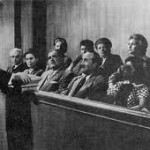




Colorado Criminal Law – Why Is The Motive For A Crime Not Required To Prove The Crime?
By H. Michael Steinberg Colorado Drug Criminal Defense Lawyer – Attorney
Colorado Criminal Law – Why Is The Motive For A Crime Not Required To Prove The Crime? Juries should know and it is often asked in open court – just WHY a person commits a crime. The “why” of the crime is known as the motive. In Colorado it is not necessary to prove the motive behind a crime only the “elements” of the offense. This article explains these Colorado criminal law concepts.
The Basic Elements of Colorado Criminal Culpability
To understand Colorado criminal law – to understand why you have been charged with a crime and what the prosecutor has to prove to convict you of that crime, you must first understand the basic requirements of criminal culpability — these are the physical actions and state of mind that are necessary to hold a person criminally responsible for their acts.
Two things are traditionally present to have committed a crime – they are the concurrence, or unity, of “an act” or physical element, also known as the actus reus” and a “mental state” or intent, also known as the mens rea. “
The act must be voluntary and cause some kind of social harm.
Therefore criminal responsibility basically has five parts – they are:
1. The actus reus
2. The mens rea
3. A combination or unity of actus reus and mens rea
4. Causation
5. And the resulting social harm
Without these five parts and the absence of a complete defense or legal “excuse” for the crime, known as an affirmative defense (such as self defense) a crime has been committed and the individual can be punished under the criminal law.
Colorado Criminal Law – Why Is The Motive For A Crime Not Required To Prove The Crime? – Where Does Motive Fit In?
Colorado criminal defense lawyers are well aware that a prosecutor need not prove the motive behind the crime. However, as a tactic at trial – in an attempt to persuade a jury that the defendant did not commit the crime, the experienced lawyer will try to suggest the “add” of this element to the DA’s burden of proving the underlying crime by focusing the jury on the lack of “motive” behind the allegations. Which – when you think about it – is the thing a jury is always looking for… the WHY of the crime.
Examples Of The Role Of Motive In The Commission Of A Crime In Colorado
Since motive is the “emotion” prompting a person to act, an example of motive might be when a man kills his wife after finding her with her lover. The motive is obvious. The charge, based on the the mental state or mens rea – is premeditation othereise known as specific intent – First Degree Murder. If the crimes was not planned – rather – it was a spontaneous, then a jury could come back with a verdict of “heat of passion” murder thus reducing the charge to a crime and a sentence which is much less serious.
But in all cases – the motive in the example was plain – jealousy.
Jealousy is not part of the mens rea and is therefore not required as an element the proof of the crime of murder. While jealousy may have motivated the crime – and it may have led the police to the suspect – the DA need not prove the “why” of the crime.
HOWEVER in a weak identification case for example… if the husband was unaware of the affair (and this could be proven) a lack of motive might force a jury to scrutinize the lack of evidence in a much more exhaustive manner ultimatley leading to a possible acquittal on the homicide charge.
Inferences and Evidence
Juries are permitted to make “reasonable inferences” from evidence that is admitted in court. For example – a jury may infer criminal intent from evidence in the form of testimony – or forensic evidence that facts that would lead a reasonable person to believe that the correct mental state was formed prior to the commission of the act. One such piece of evidence in a burglary case might be the an inference that a suspect intended to commit a burglary of a business because he was caught outside the business after business hours in possession of tools that could be used to open locks.
A good criminal defense lawyer – using motive as a “defense” might argue that his wealthy client had the tools – which can be used for more than opening locks – for another reason unrelated to a burglary. The suspect under these circumstances would have no “motive” to steal because he was already wealthy.. and the possession of the burglary tools had an alternative explanation.
Other Common Motives
Since motives are the causes or reasons that “motivate” a person to form the intent to commit a crime, another example – in a white collar criminal case – might be the receipt of insurance funds upon the death of another as a motive for murder. Or if there was a sudden financial difficulty in a man or woman’s life – there may be another financial motivation for embezzlement or burglary.
BUT – remember while the existence of a motive to commit a crime is “immaterial’ to the technical proof of guilt IF that guilt is clearly established, it is the weak case where the presence or absence of a motive might clinch he case for either side. If a Colorado DA’s case is based entirely on weak and Circumstantial Evidence, the absence of a motive might be persuasive in obtaining a not guilty verdict based on the inability of the DA to prove the case beyond a reasonable doubt.
Motive and Premeditation and Deliberation and Interest In The Outcome
Certain mental states – such as specific intent, also known as premeditation and deliberation – by their nature – almost require a determination of the defendant’s purpose in acting. It can be argued that it is in these cases that motive is relevant to this highest of mental states.
Another role of motive in a trial is to shoe a witness’s bias. Motive is relevant to establish why a witness might slant their testimony to one side or the other..for example if the witness had an interest in the outcome of a case.
The Opposite Is Not True – Poverty As A Motive For Crime
A suspects need for money – on the other hand – is NOT permissible evidence to prove the elements of a theft. It has been said that:
“Poverty as proof of motive has in many cases little tendency to make theft more probable. Lack of money gives a person an interest in having more. But so does desire for money, without poverty. A rich man’s greed is as much a motive to steal as a poor man’s poverty. Proof of either, without more, is likely to amount to a great deal of unfair prejudice with little probative value.” (U.S. v. Mitchell (9th Cir. 1999)
“The lack of money by A might be relevant enough to show the probability of A’s desiring to commit a crime in order to obtain money. But the practical result of such a doctrine would be to put a poor person under so much unfair suspicion and at such a relative disadvantage that for reasons of fairness this argument has seldom been countenanced as evidence of the graver crimes, particularly those of violence.” (2 Wigmore, Evidence, § 392)
A Fan Of Perry Mason – Means, Motive, and Opportunity
As a child – I watched (and continue to this day to watch) Perry Mason. You would often here the phrase “means, motive, and opportunity” as a method of describing why his client was charged with murder.
The ability of a suspect to commit a crime is the means, the reason the suspect needed to commit the crime is the motive, and whether or not the suspect had the actual chance to perform the crime is the opportunity.
Under these circumstances – opportunity – is useful because it introduces the concept of alibi evidence. This is evidence that proves the accused was unable to commit the crime charged because he or she was somewhere else when it occurred.
While motive is not an element of many crimes, disproving motive makes it easier for a jury to find reasonable doubt. The “Perry Mason Moment” made so famous by the series – (the real murderer always confessed in the last five minutes) almost never happens in the real world.
The law is this – evidence of ONLY motive, means, opportunity, and consciousness of guilt are NOT legally sufficient to prove guilt beyond a reasonable doubt and contrary to popular fiction – a jury cannot be allowed to convict ONLY on these three famous elements. Colorado Drug Crime Laws and Defenses
Colorado Criminal Law – Why Is The Motive For A Crime Not Required To Prove The Crime?
ABOUT THE AUTHOR: H. Michael Steinberg – Email The Author – Denver Colorado Drug Crimes Criminal Defense Lawyer or call his office at 303-627-7777 during business hours – or call his cell if you cannot wait and need his immediate assistance – 720-227-7777.
If you are charged with A Colorado crime or you have questions about Colorado Criminal Law – Why Is The Motive For A Crime Not Required To Prove The Crime?, please call our office. The Law Offices of H. Michael Steinberg, in Denver, Colorado, provide criminal defense clients with effective, efficient, intelligent and strong legal advocacy. We can educate you and help you navigate the stressful and complex legal process related to your criminal defense issue.
H. Michael Steinberg, is a Denver, Colorado criminal defense lawyer with over 40 years of day to day courtroom experience – specializing in Colorado Criminal Law along the Front Range. He will provide you with a free initial case consultation to evaluate your legal issues and to answer your questions with an honest assessment of your options. Remember, it costs NOTHING to discuss your case. Call now for an immediate free phone consultation.
Helping Clients To Make Informed Decisions In the Defense of Colorado Criminal Cases.
Contact A Lawyer with Three Decades of Experience as a Denver Criminal Attorney at The Steinberg Colorado Criminal Defense Law Firm Today.
Colorado Defense Lawyer H. Michael Steinberg provides solid criminal defense for clients throughout the Front Range of Colorado – including the City and County courts of Adams County, Arapahoe County, City and County of Boulder, City and County of Broomfield, City and County of Denver, Douglas County, El Paso County – Colorado Springs, Gilpin County, Jefferson County, Larimer County, and Weld County,…. and all the other cities and counties of Colorado along the I-25 Corridor… on cases involving …Colorado Criminal Law – Why Is The Motive For A Crime Not Required To Prove The Crime?
Other Articles of Interest:
- A Colorado Criminal Defense Lawyer – What Does A Criminal Defense Lawyer Do? DO I Really Need One
- Colorado Preliminary Hearings Law And Practice – Part I of II Preparation
- Colorado Criminal Drug Crimes Law – The Fair Fight – Stopping Prior Crimes And Bad Act 404(b) Evidence At Trial
- Colorado Preliminary Hearings Law And Practice – Part II of II – The Hearing
- Colorado Criminal Lawyer Series – Understanding Colorado Drug Crime Conspiracy Cases §18-2-201,-206














